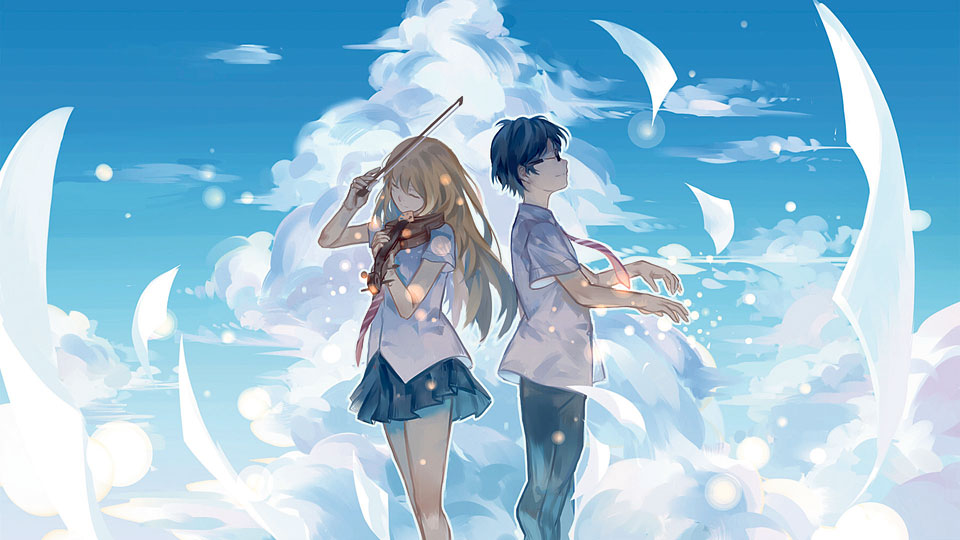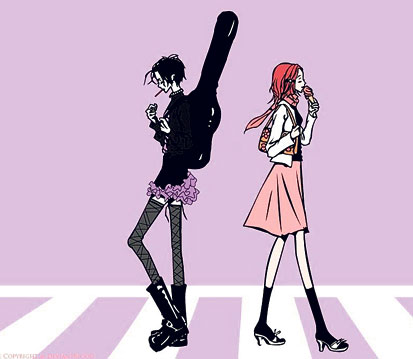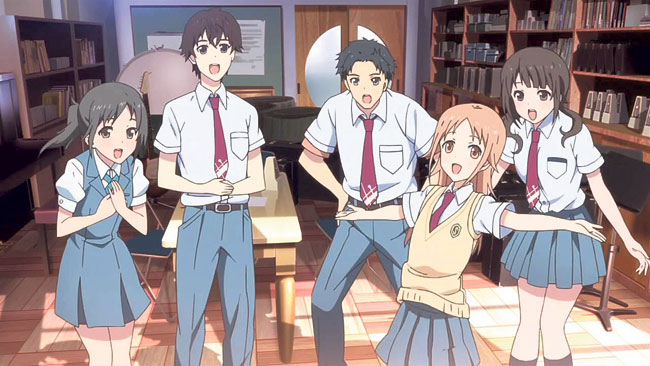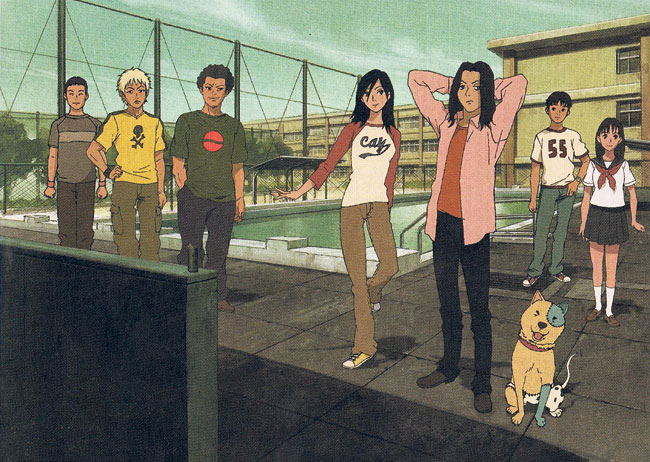Anime are magical. The Japanese animation industry builds intricate plotlines, complex characters, and fantastic animations for their anime. It shouldn’t come as a surprise that the anime industry grosses over billions of dollars from all around the world annually. Their visual impact is just as strong as their elaborate stories. Music is just as rooted in anime as they are in the Japanese culture. The opening and closing tracks to some popular anime have topped major music charts in several countries. In Japan, music is a revered art, some of the world’s greatest musicians are Japanese and recitals and music competitions are the communal norm. There is thus an entire genre of musical anime at your disposal. In Japan, musical anime aren’t about crooning lengthy dialogues as done in the west. They are about expressing the musicality of a musician and his understanding of music. To get your started, here are The Week’s recommendations.
La Corda d’Oro: Primo Passo
 Based off a role-playing online game of the same name La Corda d’Oro (Italian for ‘The Golden String’) celebrated a decade since its release just last year. Seiso Academy has two sets of students: one set under the general education and the other set, the elite, under the musical program. Kahoko Hino is your unassuming general education student who has no musical leanings or even the slightest interest in music. Enters Lili, a musical fairy who signs up Kahoko for the grand annual musical contest that has the entire town looking forward to it. Kahoko has now entrusted a magical violin (courtesy to Lili) and has few months at her disposal to master it, else face a lifetime of humiliation. Starting as a novice, all she has to hold on to is Lili’s promise that as long as she trusts her ability and her instrument, everything will be alright. Through the competition, she meets musicians who are driven by their passion and love for music. This 26-episode long anime encapsulates Kahoko’s musical awakening and is magical through and through.
Based off a role-playing online game of the same name La Corda d’Oro (Italian for ‘The Golden String’) celebrated a decade since its release just last year. Seiso Academy has two sets of students: one set under the general education and the other set, the elite, under the musical program. Kahoko Hino is your unassuming general education student who has no musical leanings or even the slightest interest in music. Enters Lili, a musical fairy who signs up Kahoko for the grand annual musical contest that has the entire town looking forward to it. Kahoko has now entrusted a magical violin (courtesy to Lili) and has few months at her disposal to master it, else face a lifetime of humiliation. Starting as a novice, all she has to hold on to is Lili’s promise that as long as she trusts her ability and her instrument, everything will be alright. Through the competition, she meets musicians who are driven by their passion and love for music. This 26-episode long anime encapsulates Kahoko’s musical awakening and is magical through and through.
Books that will help kickstart your reading habit

Your Lie In April
 Also called “Shigatsu wa Kimi no Uso”, this anime is one of the best stories that has come from the Japanese anime industry. Kosei Arima is a piano prodigy – his skills are lauded by music critics and envied by fellow pianists (both older and closer to him in age). But after the death of his mother whom he was closely attached to, he has a mental breakdown during a performance and loses his musical hearing i.e. his auditory senses are unharmed and he can hear everything except the notes of his piano. He promptly drops playing the piano and begins shunning music. Four years pass and Arima is leading an ordinary life with his group of friends when meets Kaori Miyazono, a free spirited violinist for whom music is synonymous to freedom. Miyazono hurricanes her way through with her eclectic mannerisms and forces him on to his piano. This anime isn’t just about one musician rediscovering his passion for music – it’s about friendship, hard work, and shedding misconstrued ideas about music and life.
Also called “Shigatsu wa Kimi no Uso”, this anime is one of the best stories that has come from the Japanese anime industry. Kosei Arima is a piano prodigy – his skills are lauded by music critics and envied by fellow pianists (both older and closer to him in age). But after the death of his mother whom he was closely attached to, he has a mental breakdown during a performance and loses his musical hearing i.e. his auditory senses are unharmed and he can hear everything except the notes of his piano. He promptly drops playing the piano and begins shunning music. Four years pass and Arima is leading an ordinary life with his group of friends when meets Kaori Miyazono, a free spirited violinist for whom music is synonymous to freedom. Miyazono hurricanes her way through with her eclectic mannerisms and forces him on to his piano. This anime isn’t just about one musician rediscovering his passion for music – it’s about friendship, hard work, and shedding misconstrued ideas about music and life.
Nana
 With a whooping 40 million manga sales, Nana was adopted into an anime series years ago but its narrative remains fresh and heartfelt even today. This anime is about a fateful meeting of two girls both named Nana. Komatsu Nana has humble small town origins and moves to Tokyo at the behest of her boyfriend. Nana Osaki, on the other hand, is the lead vocalist of a punk-rock band called Black Stones (BLAST) and arrives in Tokyo with dreams of making it big as a singer. While one Nana is reserved and accommodating, the other is a whole torrent of a character. In Tokyo, the two end up as roommates and become friends. The whole anime follows a series of events as the two deal with their own struggles – one seeking fame and the other just some compassion. Although similarly named and of the same age, the differences in the two Nanas is obvious right from the beginning. Also this anime has inarguably one of the best soundtracks. Nana is a delight to all story and music lovers.
With a whooping 40 million manga sales, Nana was adopted into an anime series years ago but its narrative remains fresh and heartfelt even today. This anime is about a fateful meeting of two girls both named Nana. Komatsu Nana has humble small town origins and moves to Tokyo at the behest of her boyfriend. Nana Osaki, on the other hand, is the lead vocalist of a punk-rock band called Black Stones (BLAST) and arrives in Tokyo with dreams of making it big as a singer. While one Nana is reserved and accommodating, the other is a whole torrent of a character. In Tokyo, the two end up as roommates and become friends. The whole anime follows a series of events as the two deal with their own struggles – one seeking fame and the other just some compassion. Although similarly named and of the same age, the differences in the two Nanas is obvious right from the beginning. Also this anime has inarguably one of the best soundtracks. Nana is a delight to all story and music lovers.
Tari Tari
 What is unique about musical anime is that they are very rarely focused on a single person’s musical journey. Rather they portray the musical awakenings of a group of young people who begin with a very limited understanding of music but go on to interpret it in their own ways. In doing so, their stories are intertwined and the anime becomes of not just characters but understanding the incomprehensible, that in this case is music. Tari Tari is exactly that. It’s about five Japanese school girls as they set up their own choir club to perform at their school’s annual recital after having been barred from the school’s own choir group. The focus of the story is really not in their discovering their own way of loving music but it’s more about how the quintet get through their own obstacles. Most challenges they face are very similar to those we face, but the anime shows respect to these events. It does not discount cultural shifts, parental discord and feelings of alienation as just mundane happenings that everyone experiences but rather acknowledges their gravity and importance.
What is unique about musical anime is that they are very rarely focused on a single person’s musical journey. Rather they portray the musical awakenings of a group of young people who begin with a very limited understanding of music but go on to interpret it in their own ways. In doing so, their stories are intertwined and the anime becomes of not just characters but understanding the incomprehensible, that in this case is music. Tari Tari is exactly that. It’s about five Japanese school girls as they set up their own choir club to perform at their school’s annual recital after having been barred from the school’s own choir group. The focus of the story is really not in their discovering their own way of loving music but it’s more about how the quintet get through their own obstacles. Most challenges they face are very similar to those we face, but the anime shows respect to these events. It does not discount cultural shifts, parental discord and feelings of alienation as just mundane happenings that everyone experiences but rather acknowledges their gravity and importance.
Beck: Mongolian Chop Squad
 Beck deviates from the usual animating style of most anime. The animation is gritty and sharply focused but the style complements a story of such nature. In what can only be described as a Bohemian Rhapsodic manner, Yukio Tanaka meets Ryuusuke Minami (Ray) after saving his dog from a group of bullying teenagers. Ray, it turns out, is a former member of a well-known rock band and a sensational guitarist. Tanako, who harbors his own dreams of becoming a musician, is immediately in awe of Ray. With Ray’s sister and a couple of other musicians, the five form a band and call themselves Beck. Beck chronicles the journey of a hesitating group of musicians, discovering their artistry, their rise to fame and their struggles with keeping it. The anime is sincere in its portrayal of how fame tests friendships and morality. And, just as Nana, Beck’s soundtrack is unforgettable too.
Beck deviates from the usual animating style of most anime. The animation is gritty and sharply focused but the style complements a story of such nature. In what can only be described as a Bohemian Rhapsodic manner, Yukio Tanaka meets Ryuusuke Minami (Ray) after saving his dog from a group of bullying teenagers. Ray, it turns out, is a former member of a well-known rock band and a sensational guitarist. Tanako, who harbors his own dreams of becoming a musician, is immediately in awe of Ray. With Ray’s sister and a couple of other musicians, the five form a band and call themselves Beck. Beck chronicles the journey of a hesitating group of musicians, discovering their artistry, their rise to fame and their struggles with keeping it. The anime is sincere in its portrayal of how fame tests friendships and morality. And, just as Nana, Beck’s soundtrack is unforgettable too.


































